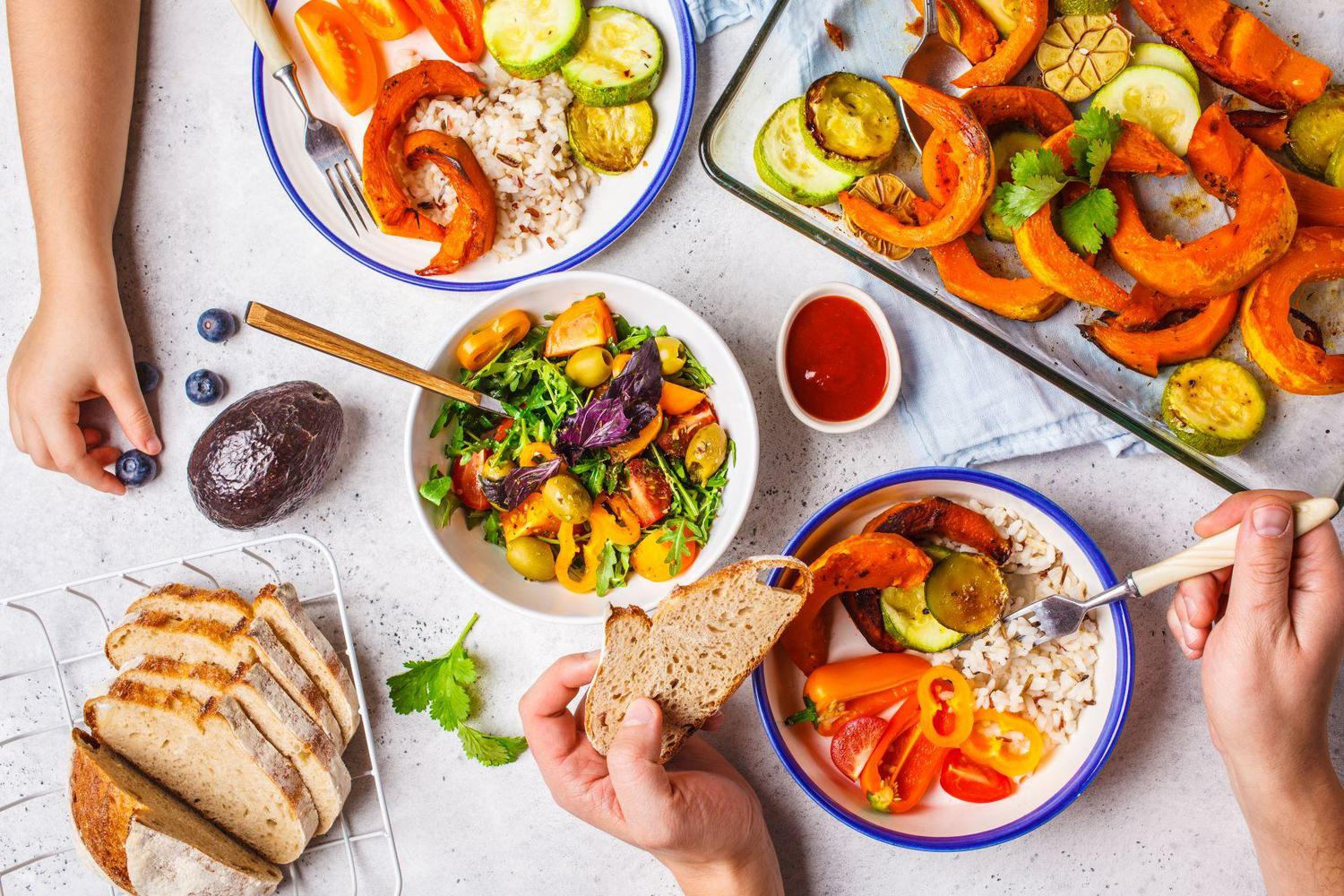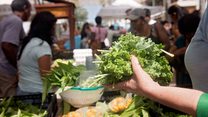Recent years have seen plant-rich diets go from fringe fad to mainstream lifestyles, and with the positive impact they have on personal health, animal welfare and your carbon footprint, it’s easy to understand why. In Cayman, many residents are adopting this way of life as supermarkets, restaurants and shops offer more and more vegan-friendly options.
On This Page
What is a Vegan Diet?
Veganism is defined as a way of living that attempts to exclude all forms of animal exploitation and cruelty for any purpose. Hence, the vegan diet is devoid of all animal products, including meat, eggs and dairy. Vegans opt for a plant-based diet, made up of vegetables, fruits, nuts, legumes and pulses. The exponential growth of veganism and plant-based eating can be attributed in part to the benefits of this lifestyle. It seems theres no shortage of reasons as to why more and more families are embracing the vegan diet.
Why Try a Plant-based Diet?
Animal Welfare

Veganism is free from all products that come from animals including meat, fish, insects, dairy and eggs. Only consuming plant-based foods means no animals are mistreated or killed in the process of making food for human consumption. Enjoying a plant-based diet is one of the most obvious ways you can take a stand against animal cruelty and animal exploitation everywhere.
Limited Resources
Food security is becoming a major concern across the globe, and we simply do not have enough land to feed an ever-growing population an animal-based diet. Earth only has a limited area of viable agricultural land, and meat-heavy diets are a huge drain on vital resources that we desperately need to conserve.

Rearing livestock for meat and dairy requires an enormous amount of grain feed which is a major contributor to deforestation. A plant-based diet requires significantly less land to feed humans. With water insecurity and food poverty rising around the world, a plant-based diet is a brilliant way to practise sustainable living.
Planet Earth

Every piece of food we eat has an impact on the environment, but some foods make much more of an impact than others. Each one of us has a carbon footprint, a net total of greenhouse gas emissions generated by our own actions, and what we eat is one of the biggest contributors. The production of meat is taking a heavy toll on the planet; breeding, raising and slaughtering billions of animals requires massive amounts of natural resources, such as fresh water and land, and it also generates huge amounts of pollution and waste. According to research done at the University of Oxford, plant-based diets reduce food emissions by up to 73% depending on where you live. By enjoying a plant-based diet, you could shrink your carbon footprint immeasurably.
Related Articles
Your Own Health

Well-informed, plant-based diets promote good health and can result in weight loss. Naturally, they tend to reduce your calorie intake without actively focusing on cutting down. Many animal products are high in fat and calories, so replacing them with vegetables, beans, pulses and some meat-substitutes can help manage your weight. Its important to note that meat substitutes such as veggie burgers and sausages can contain high amounts of salt and can be highly processed, so consuming them in small amounts is suggested. Focus on fruits, vegetables, nuts, seeds, grains and legumes.
Getting the Right Nutrients for Yourself and Your Family
Energy
Plant-based diets tend to be less energy dense than those that contain meat, dairy and eggs, so children need larger quantities to get enough energy. Adding healthy oils to food adds calories and encourages the production of fatty acids needed for brain development. Important foods to include: fresh fruits such as banana, mango, pear, berries, kiwi and avocado; vegetables including leafy greens; nut butters (peanut and almond); nuts (walnuts, almonds, Brazil, pecans).
Fibre
A plant-rich diet can be high in fibre, which is great! However, high fibre foods can be very filling and cause children to get full before they have eaten enough calories and have got the nutrients they need. Opt for nutrient-rich foods like avocado, nuts and dried fruits.
Helpful Tip
It's always best to get nutrients from your diet, but if you're needing a little extra help, check out our article on supplementation options in Cayman.
Vitamin D
Vitamin D regulates the amount of calcium and phosphate in the body, keeping bones, teeth and muscles healthy. Being in sunny Cayman means we are unlikely to fall short of this vitamin. Our bodies produce it when our skin is exposed to sunlight. But, of course, make sure youre protecting your skin with SPF. You can also find vitamin D in fortified fat spreads, breakfast cereals and unsweetened soya drinks. Supplements are also available, but be sure to check the label to ensure they are not of animal origin.
Iron
Iron is essential in the production of red blood cells. A vegan diet can be high in iron but iron from plant-based food is absorbed by the body less well than food from red meat. There are lots of alternatives you can fill your plate with to get your iron intake. Lentils, chickpeas, beans, tofu, cashew nuts, chia seeds, ground linseed, hemp seeds, pumpkin seeds, dark leafy veg (watercress, broccoli, kale), dried apricots and figs, raisins, quinoa and fortified breakfast cereal.
Vitamin B12
Vitamin B12 helps to keep your bodys blood and nervous system healthy. It also helps make DNA, the genetic material in your cells. Fortified breakfast cereals, fortified unsweetened soya drinks, yeast extract (Marmite) and nutritional yeast are all great sources of B12.
Omega 3 Fatty Acids
Omega 3 helps build and maintain a healthy body. Its an energy source that helps keep your heart, lungs, blood vessels and immune system working correctly. There are lots of delicious foods on a plant-based diet which will provide you with omega 3 fatty acids. Avocado, blueberries, flax seeds and hemp seeds, walnuts, edamame and soya-based foods such as tofu.
Protein
Protein is really important in helping to build and maintain muscles. It boosts your metabolism, strengthens the immune system and is a good source of energy. Great foods that contain protein are tofu, tempeh, edamame, lentils, beans, nutritional yeast, nuts, seeds, quinoa and oats.
Going Plant-based in Cayman
Heralded as the Caribbeans Culinary capital, Caymans food scene is vast and delicious. Though many menus feature meat, fish and dairy-heavy dishes, you dont have to look too hard to find the plant-based havens among us. Our three-island nation is a world leader for vegan friendliness and plant-based living, as our restaurants and supermarkets have demonstrated.
Plant-based Alternatives
If you and your family have always been meat and fish lovers, the initial step into a plant-based diet may be the introduction of meat alternatives. Often, these meat alternatives are fortified with the vitamins and minerals that are lost when we stop eating animal products. Ingredients such as tofu, tempeh and jackfruit are rich in protein and fibre and low in fat.
However, its easy to end up relying on meat alternatives due to their readiness of flavour and ease of cooking, but beware of fillers, added sodium and artificial ingredients. Opt for clean foods such as fruits, vegetables, grains, nuts and seeds.
Good things to look for in your meat alternatives are: whole foods such as beans, grains, nuts and seeds; added vitamins and minerals like B12 and iron; the non-GMO project certification label; and protein-rich products such as pea protein (note that pea protein is a legume and should be avoided by those with a legume allergy). A few things to avoid are: long lists of artificial ingredients; added sugar and salt; and those who suffer with celiac disease or an intolerance to gluten should avoid seitan and wheat gluten.
Though meat alternatives are great options, processed food is still processed food, so try eating clean plant-based foods with only one or two meat and dairy alternatives a week. It may seem like a minefield, but its simply a case of reading labels and understanding what youre putting into your body, as you would when choosing your meat and dairy products.
Meat Alternatives
- Lightlife
- Field Roast
- The Jackfruit Company
- Impossible
- Beyond Meat
- Tofurky
- Boca
- Linda McCartney
- Quorn (some contain egg/milk)
- House Foods Tofu
Dairy alternatives
- Violife
- Yves
- Follow Your Heart
- Field Roast Chao
- Moocho
Important things to Consider
Going plant-based is not an easy shift, especially when you have a family to think of. It's important to be well-informed before taking on this kind of lifestyle change. Though we've highlighted important things to consider, it may be helpful to consult a nutritionist or your GP if you have uncertainties.
Whilst Pregnant

If youre pregnant and enjoy a plant-based diet, you must ensure you get enough iron, vitamin B12 and calcium. Being in sunny Cayman, you wont be short of vitamin D. However, you may want to consult a nutritionist or midwife about getting enough nutrients for yourself and your growing baby.
Whilst Breastfeeding

As a rich source of vital nutrients, breastfeeding is preferable if you can. However, if formula is better for you and your baby, select one with vitamin B12 that is fortified with iron and calcium. Speak to your doctor, dietician or health advisor for recommendations. Plant-based drinks (such as soy and oat) are not appropriate for babies less than 1 year as they do not have the right ratio of carbohydrates, proteins and fats. They also lack vital nutrients for growth and development.
Whilst Weaning

An iron-fortified infant cereal is a great first option. The cereal can be mixed with expressed breast milk or a plant-based formula. Vegetables and cereal foods, such as barley, quinoa and pulses are all good options. Make sure to purée well. Naturally sweet fruits (apples, bananas) and vegetables (carrots, sweet potatoes, butternut squash) can be used to sweeten a meal, instead of using refined sugar. As your babys intake of breast milk or formula decreases, you may want to consider supplementation.
Adopting a plant-based diet can feel difficult and inconvenient to you and your family. But if you're looking to reduce your carbon footprint or simply eat a little healthier, then give it a go. The humanitarian, environmental and health benefits make plant-based eating a great endeavour, even for just a couple of nights a week.








